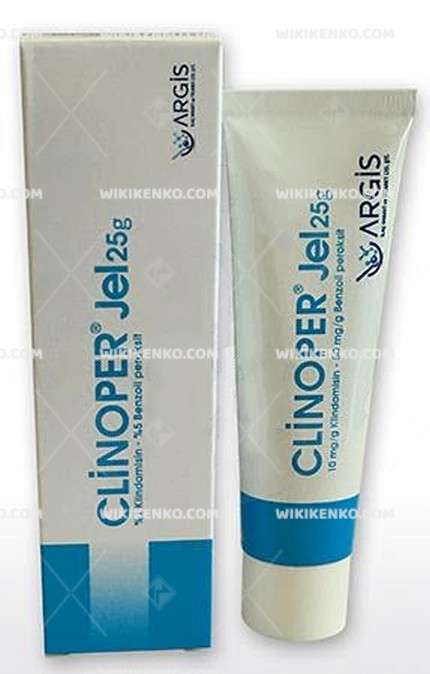Clinoper Gel
Clinoper Gel is a medication designed for the topical treatment of mild to moderate acne vulgaris. It proves particularly effective against inflammatory lesions and is suitable for both adults and adolescents aged 12 years and above.
| Dosage form | |
|---|---|
| Pack size | |
| Potency | 25G |
| Manufacturer | |
| Origin | |
| Generic Name (Ingredient) | Combined |
Assuming your emergency circumstances for this product, visit Urgent Quotation page. Besides, for any pharmaceutical questions, please ask us in the comments section.
Description
Active Ingredients
Clinoper Gel comprises two active substances: Klindamisin Fosfat (Clindamycin Phosphate) and Benzoil Peroxide. Here are the concentrations of these vital components in the gel:
- Clindamycin Phosphate: Equivalent to 1% w/w (10 mg/g) Clindamycin
- Benzoyl Peroxide: 5% w/w (50 mg/g)
Formulation and Packaging
Clinoper Gel is available in a gel form, conveniently packaged in 25g tubes.
Mechanism of Action
The amalgamation of Clindamycin and Benzoyl Peroxide in Clinoper Gel operates by eradicating the bacteria responsible for acne while maintaining the cleanliness of skin pores. This combined action significantly reduces the number of acne lesions.
Usage Instructions
Clinoper Gel should be applied once daily, preferably in the evening, to the entire affected area. It’s important to avoid excessive application, as it won’t enhance efficacy and may escalate the risk of skin irritation. If you experience excessive dryness or peeling, consider reducing the application frequency or temporarily discontinuing use.
Expected Results
Positive effects on inflammatory and non-inflammatory lesions may become noticeable as early as weeks 2 to 5 of treatment. Clinical trials for acne vulgaris have not extended beyond 12 weeks, so it’s essential not to exceed 12 weeks of continuous use.
Precautions
While no formal drug-drug interaction studies have been conducted with Clinoper Gel, caution is advised when using it alongside:
- Concomitant topical antibiotics
- Medicated or abrasive soaps and cleansers
- Soaps and cosmetics with a strong drying effect
- Products with high alcohol and/or astringent concentrations
A cumulative irritant effect may occur in these situations.
Conclusion
Clinoper Gel proves to be an effective treatment for mild to moderate acne vulgaris. Its unique combination of active ingredients offers a potent solution for reducing acne lesions. However, users should exercise caution to prevent skin irritation and should not exceed the recommended treatment duration.
| Aspect | Information |
|---|---|
| Medication Name | Clinoper Gel |
| Indication | Mild to moderate acne vulgaris |
| Active Ingredients | Clindamycin Phosphate, Benzoyl Peroxide |
| Concentrations | Clindamycin: 1% w/w (10 mg/g) |
| Benzoyl Peroxide: 5% w/w (50 mg/g) | |
| Form | Gel |
| Packaging | 25g tube |
| Mechanism of Action | Antibacterial and anti-inflammatory |
| Usage Instructions | Apply once daily to affected area |
| Expected Results | Visible improvement in 2-5 weeks |
| Maximum Duration | 12 weeks |
| Precautions | Avoid contact with eyes and mucous membranes |
| Minimize sun exposure | |
| Watch for skin irritation |
FAQ
What are the side effects of Clinoper Gel?
The side effects of this gel may include itching (pruritus), dry skin, skin redness, and skin tingling. It’s important to note that not everyone will experience these side effects, and if you do, consulting with a healthcare professional is recommended.
How long does it take for Clinoper Gel to work?
Clinoper Gel can begin to show its effects on inflammatory and non-inflammatory lesions as early as weeks 2-5 of treatment. However, it should not be used continuously for more than 12 weeks.
What are the precautions when using Clinoper Gel?
When using this gel, several precautions should be taken, including avoiding contact with eyes and mucous membranes, minimizing sun exposure, watching for skin irritation, and discontinuing use if hypersensitivity or severe irritation develops.
Can I use Clinoper Gel with other acne medications?
Clinoper Gel can be used with other acne medications, but caution is advised to avoid interactions and potential exacerbation of side effects. It’s always recommended to consult with a healthcare professional before combining acne treatments.
How does Clindamycin work against acne vulgaris?
Clindamycin, a component of Clinoper Gel, acts against acne vulgaris by killing or inhibiting the growth of bacteria responsible for acne, particularly Propionibacterium acnes (P. acnes). Additionally, it possesses anti-inflammatory properties, making it effective in reducing acne-related inflammation.
Use the form below to report an error
Please answer the questions as thoroughly and accurately as possible. Your answers will help us better understand what kind of mistakes happen, why and where they happen, and in the end the purpose is to build a better archive to guide researchers and professionals around the world.
The information on this page is not intended to be a substitute for professional medical advice, diagnosis, or treatment. always seek the advice for your physician or another qualified health provider with any questions you may have regarding a medical condition. Always remember to
- Ask your own doctor for medical advice.
- Names, brands, and dosage may differ between countries.
- When not feeling well, or experiencing side effects always contact your own doctor.
Cyberchondria
The truth is that when we’re sick, or worried about getting sick, the internet won’t help.
According to Wikipedia, cyberchondria is a mental disorder consisting in the desire to independently make a diagnosis based on the symptoms of diseases described on Internet sites.
Why you can't look for symptoms on the Internet
If diagnoses could be made simply from a textbook or an article on a website, we would all be doctors and treat ourselves. Nothing can replace the experience and knowledge of specially trained people. As in any field, in medicine there are unscrupulous specialists, differences of opinion, inaccurate diagnoses and incorrect test results.



Reviews
There are no reviews yet.